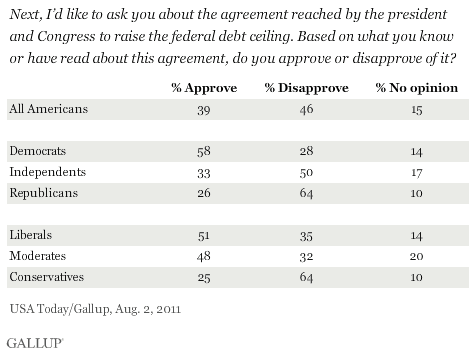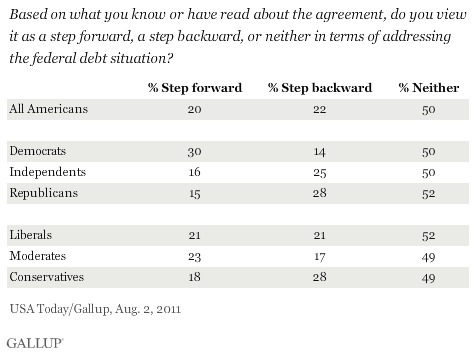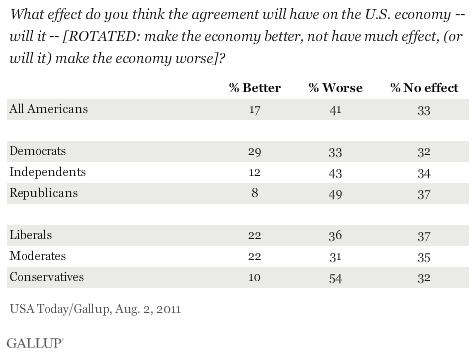PRINCETON, NJ -- Americans are more likely to oppose (46%) than favor (39%) the agreement President Obama and Congress reached to raise the federal debt ceiling. Majorities of Democrats and liberals favor the agreement, while conservatives and Republicans largely oppose it.

The results are from an Aug. 2 USA Today/Gallup poll conducted the night after the bill was passed by the Senate and signed into law by President Obama. This concluded weeks of tense negotiations to raise the amount of money the government could legally borrow by the Treasury Department's Aug. 2 deadline or face the United States' possibly defaulting on its obligations.
Americans are quite pessimistic that the debt ceiling agreement will have a positive impact on the United States' debt situation. Twenty percent view it as a "step forward" in addressing the situation, while roughly the same percentage, 22%, say it is a "step backward." Half think it will have little impact, describing it as neither a step forward nor a step backward.
Democrats are the political group most likely to view it as a step forward, but roughly half of each party or ideological group says it will likely not affect the debt situation in a positive or negative way.

Pessimism About the Agreement Extends to the Economy
The uncertainty about the debt ceiling leading up to the Aug. 2 deadline had already had a negative effect on the U.S. economy in terms of the recent stock market downturn and declining U.S. consumer confidence. Now that a law has been passed, however, few Americans when asked specifically about the economic impact of the agreement believe it will make the U.S. economy better.
A plurality of Americans (41%) say the debt ceiling agreement will make the economy worse, more than twice the percentage who think it will make the economy better (17%). One in three do not believe it will have much effect on the economy.
Consistent with their more negative views on the debt agreement in general, Republicans and conservatives are most likely to be pessimistic about its effect on the economy. Relatively few Democrats and liberals say it will make the economy better.

Implications
Many of the political leaders who brokered the debt ceiling agreement have expressed much less than full satisfaction with its terms. Americans seem to share that lack of enthusiasm, with more disapproving than approving of the deal, a small minority viewing it as a step forward in addressing the U.S. debt situation, and more expecting it to have a negative than a positive effect on the economy.
Americans' reactions may signify a realization that the agreement is far from the final word on the federal debt situation. The law calls for the formation of a bipartisan congressional committee to search for additional spending cuts to avoid automatic cuts to defense and domestic spending that would go into effect if the committee cannot find additional savings this year. Erskine Bowles, co-chairman of last year's federal debt commission, notes that this week's agreement does not address tax reform or rising healthcare costs, two key drivers of the deficit problem.
Americans as a whole increasingly view the debt and deficit as a problem, with the percentage naming it as the most important problem in recent months the highest in more than a decade. Americans' tepid response to the debt agreement suggests that their perception of the debt as a national problem is not likely to recede anytime soon.
Survey Methods
Results for this USA Today/Gallup poll are based on telephone interviews conducted Aug. 2, 2011, on the Gallup Daily tracking survey, with a random sample of 1,012 adults, aged 18 and older, living in all 50 U.S. states and the District of Columbia.
For results based on the total sample of national adults, one can say with 95% confidence that the maximum margin of sampling error is ±4 percentage points.
Interviews are conducted with respondents on landline telephones and cellular phones, with interviews conducted in Spanish for respondents who are primarily Spanish-speaking. Each sample includes a minimum quota of 400 cell phone respondents and 600 landline respondents per 1,000 national adults, with additional minimum quotas among landline respondents for gender within region. Landline telephone numbers are chosen at random among listed telephone numbers. Cell phone numbers are selected using random-digit-dial methods. Landline respondents are chosen at random within each household on the basis of which member had the most recent birthday.
Samples are weighted by gender, age, race, Hispanic ethnicity, education, region, adults in the household, and phone status (cell phone only/landline only/both, cell phone mostly, and having an unlisted landline number). Demographic weighting targets are based on the March 2010 Current Population Survey figures for the aged 18 and older non-institutionalized population living in U.S. telephone households. All reported margins of sampling error include the computed design effects for weighting and sample design.
In addition to sampling error, question wording and practical difficulties in conducting surveys can introduce error or bias into the findings of public opinion polls.
Polls conducted entirely in one day, such as this one, are subject to additional error or bias not found in polls conducted over several days.
View methodology, full question results, and trend data.
For more details on Gallup's polling methodology, visit www.gallup.com.
